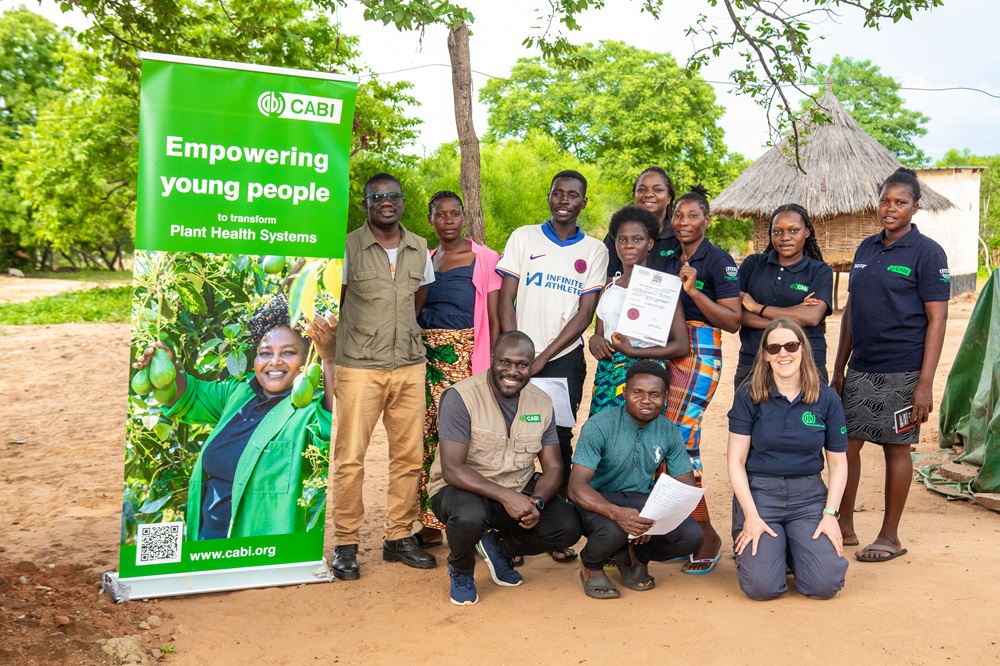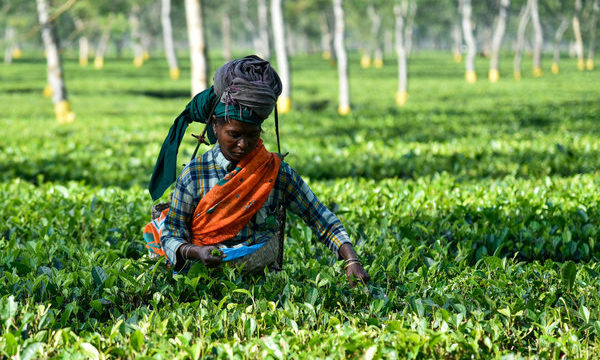
Ahead of International Youth Day on Tuesday 12 August 2025, Deogratius J. Magero, CABI’s Youth Manager, outlines seven key strategies – drawing from CABI’s Youth Engagement Strategy – to help ensure agricultural training and engagement are truly youth inclusive.
As the world approaches 2030, young people are projected to make up 57% of the global population. This demographic shift represents both a challenge and a transformative opportunity: the challenge of providing adequate employment and the opportunity to leverage youth potential in critical sectors like agriculture.
Agriculture remains a cornerstone of economic development and food security, especially across low- and middle-income countries. Yet, the sector is often overlooked by the very demographic it could most benefit – youth.
International Youth Day 2025, themed “Youth Advancing Multilateral Cooperation Through Technology and Partnerships”, highlights the pivotal role young people play in global development. Their active participation in agriculture – enabled through inclusive training, technology, and strategic partnerships – is essential for sustainable food systems and economic growth.
Drawing from CABI’s Youth Engagement Strategy and grassroots experience, here are seven key strategies to ensure agricultural training and engagement are truly youth inclusive.
Shifting the perception of agriculture
Young people often perceive agriculture as outdated, labour-intensive, and financially unrewarding. Changing this perception is foundational to attracting youth into the sector.
CABI actively works to redefine agriculture by highlighting entrepreneurial opportunities beyond traditional farming. These include agribusiness services, biological control, value addition, green entrepreneurship, and digital market facilitation. By promoting success stories of young agripreneurs and facilitating training through Community Agribusiness Development Hubs in Kenya, Zambia, and Uganda, CABI demonstrates the viability of agriculture as a dynamic, modern career path.
Integrating technology and digital skills
Today’s youth are digital natives. Integrating digital tools and platforms into agricultural training not only engages them more effectively but also equips them for the future of farming.
Through its PlantwisePlus programme, CABI trains youth in using technology for sustainable pest management, fertilizer application, and digital marketing. Digital platforms like The CABI Academy offer self-paced courses such as agribusiness and bioprotection, while technologies such as Earth Observation data and drone services introduce cutting-edge methods in crop monitoring and management.
These efforts collectively position agriculture as a “tech-forward” industry, aligning with youth interests and global sustainability goals.
Emphasizing entrepreneurship and business development
Training in agriculture must go beyond basic agronomy – it should cultivate entrepreneurial mindsets and business acumen.
CABI equips young people with business modelling skills, financial literacy, and market linkage opportunities. In Zambia, for example, youth trained under the “Village-Based Biocontrol of Fall Armyworm” project now have established farmer cooperatives and now operate microenterprises offering pest control services, input supply, and crop aggregation.
Over 1,100 youth in Kenya and Uganda have received similar support under the PlantwisePlus programme, creating service-based businesses, seed enterprises, and value-added agricultural ventures. CABI’s “Entrepreneurship in Agribusiness” course supports this transition from farmer to business owner, encouraging sustainable agribusiness growth.
Providing practical experience and mentorship
Practical, hands-on training and mentorship are essential for developing the confidence and competence of young agripreneurs.
CABI emphasizes field-based learning, offering direct training in pest diagnosis, integrated pest management, seedling production, and orchard management. In parallel, CABI supports peer mentorship structures. Trained youth mentors – many of whom are graduates of CABI programmes – support 4 to 6 peers each, fostering local leadership and knowledge sharing.
This peer mentorship model significantly amplifies outreach and builds a sense of ownership and agency within communities.
Facilitating access to resources and networks

Training alone is not enough. Young people need access to land, finance, inputs, and markets to translate skills into sustainable livelihoods.
CABI doesn’t provide direct funding but creates pathways through partnerships with government agencies, private sector actors, and farmer cooperatives. These partnerships help youth navigate certification processes, access input supply chains, and build market linkages.
For instance, CABI has worked with Uganda’s Ministry of Agriculture (MAAIF), Kenya Plant Health Inspectorate Service (KEPHIS), and Zambia’s Seed Control and Certification Institute (SCCI) to support youth-led seed businesses. Additionally, through collaborations with development organizations like MESPT and private sector players like KEITT exporters, CABI boosts youth visibility in national agribusiness expos and value chains.
Incorporating a gender-responsive approach
For agricultural training to be truly inclusive, it must address the unique challenges faced by young women in agriculture.
CABI’s gender-focused research and programming aim to level the playing field. This includes ensuring equal access to resources, mentorship, and training for young women, while actively addressing structural biases in the sector.
By designing programs that enable equitable participation and leadership, CABI is helping to create agricultural systems that benefit from the full talents of both young men and women. Gender-responsive approaches ensure that no one is left behind in the transformation of rural economies.
Advocating for youth-friendly policies and enabling environments
Sustainable youth engagement in agriculture requires supportive policies that reduce barriers and open new opportunities.
CABI consistently engages with member countries and policymakers to promote youth-inclusive agricultural frameworks. It advocates for youth representation, accessible financing, and regulatory reforms that align with evolving market demands.
A standout example is the commissioning of 18,000 agripreneurs by the President of Kenya in 2024, including many CABI-trained youth. This initiative serves as a powerful validation of youth contributions and signals a growing political will to invest in young people’s agricultural futures.
Conclusion: Seeding the future
Youth are not just the future – they are the now. Their active inclusion in agriculture through relevant, practical, and empowering training is vital for sustainable development, food security, and economic resilience.
By implementing these seven strategies – shifting perceptions, integrating technology, promoting entrepreneurship, offering practical experience, improving access to resources, embracing gender equity, and enabling policy support – governments, development partners, and private actors can unlock the full potential of youth in agriculture.
Additional information
Main image: Chipo Garawaziba, the youth lead farmer on biocontrol in Siavonga, Zambia, explains to fellow farmers how to crush and spray virus-infected larvae on maize as part of the project “Village-Based Biocontrol of Fall Armyworm” (Credit: CABI).
Relevant stories
‘CABI hosts panel to discuss youth engagement for biological control of fall armyworm in Zambia.’
2 Comments
Leave a Reply
Related News & Blogs
Bridging the gap: How youth agripreneurs are empowering farmers across East Africa
Youth agripreneurs across East Africa are helping farmers access practical, local support that improves yields, increases incomes, and strengthens sustainable farming.
6 February 2026




Thank you so much CABI for empowering our youths with knowledge and new technologies 🙏
In Pakistan we have same problem of army worm in Maize crops, same approach can be followed to help farmers.